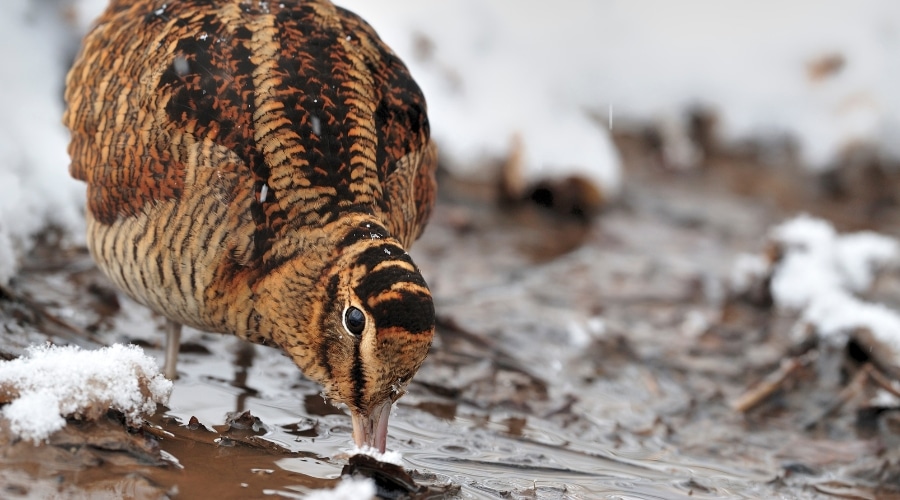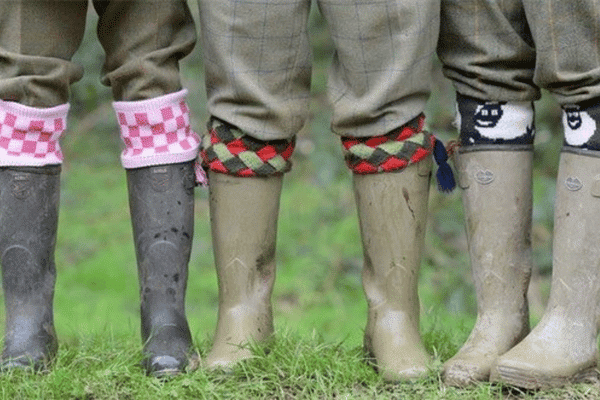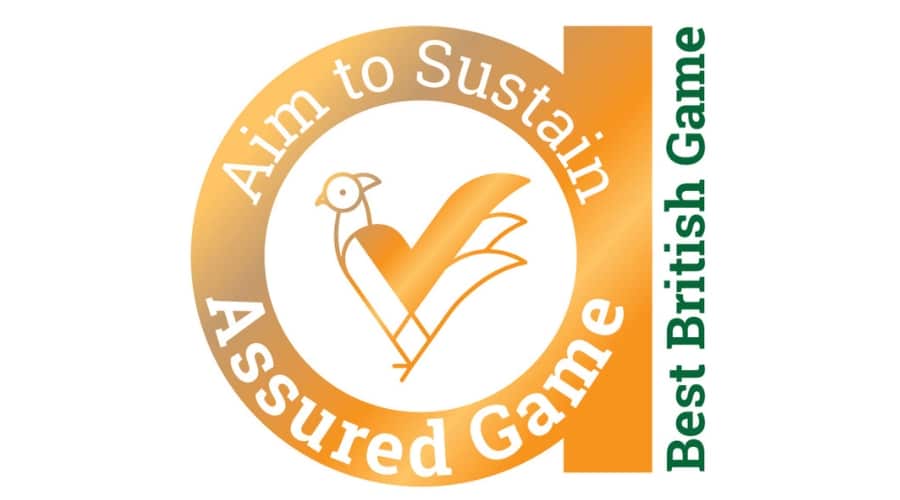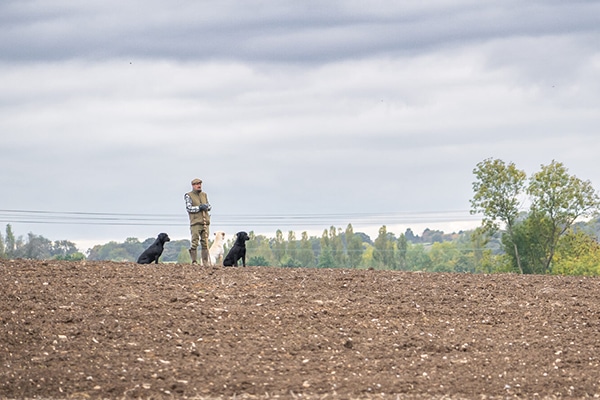
MPs refute woodcock petition claims in parliamentary debate
A debate held in Parliament yesterday on the shooting season for woodcock saw MPs push back on claims made under a petition instigated by Wild Justice.
Get information on the legal shooting season for mammals and birds in the UK.
Learn about our current conservation projects and how you can get involved.
Comprehensive information and advice from our specialist firearms team.
Everything you need to know about shotgun, rifle and airgun ammunition.
Find our up-to-date information, advice and links to government resources.
Everything you need to know on firearms law and licensing.
All the latest news and advice on general licences and how they affect you.


This article, by George Padley, first appeared in Fieldsports Journal. BASC members can receive a 20% discount on subscriptions with code BASC20
The world of driven shooting can be intimidating and confusing to the newcomer – a minefield of alien traditions, customs and etiquette. But with a bit of homework and prior preparation, your first day on the peg can be both enjoyable and rewarding.
Driven shooting is now accessible to people of all backgrounds and from all walks of life. Thanks largely to the commercialisation of the sport, pretty much anyone can book a day’s shooting, simply by clicking a ‘Book now’ button.
But there is a glitch in the system – there is no requirement for you to prove that you are a proficient shot, have an understanding of the ways of the countryside, the etiquette and the ethics that go hand in glove with shooting and, most importantly, that you are safe and will not pose a risk to beaters, pickers-up and fellow guns.
There are important traditions that must be upheld, strict rules and a code of conduct that all guns must adhere to, and there is a level of etiquette – much of which is unwritten – that is expected of all game shots.
A day’s shooting starts with an invite or a confirmed booking. Should you be lucky enough to receive an invite to shoot as someone’s guest, you should respond, in writing or by email at the very least, as promptly as possible.
Bear in mind that if you are unable to attend, your host will need to find someone to take your place. If you can make it, it is a good idea to clarify any details that will be important later on: Where exactly will you be meeting and at what time? Will you need your own 4X4 transport, or will there be a gunbus? Is it okay to bring a dog with you?
Although there is a dress code that comes with driven shooting, do not worry if you do not have the latest £500 tweed shooting jacket and matching breeks. But, equally, you probably don’t want to be the odd one out in the team photograph who’s wearing a neon ski jacket and baseball cap.
There are certain things that you will need, and if you don’t have certain items, you can always borrow them from a shooting friend.
Apart from a suitable gun (over-under or side-by-side, NOT a semi auto or pump action!) you will also need enough cartridges, a cartridge bag, a waterproof shooting jacket with large, easily accessible pockets (for cartridges), ear defenders, a suitable hat (such as a tweed cap), a shirt (checked tattersall or similar) and tie, green or brown wellies or alternative waterproof boots, a pair of brogues or equivalent (you should arrive wearing these and change into your boots when you set off for the first drive, and change back into them if lunch is to be taken indoors), either tweed or moleskin breeks and long shooting socks, or tweed or moleskin trousers.
A pair of shooting gloves will be useful during the colder months and, if you are to use a side-by-side, a glove for your lead hand or a barrel sleeve is recommended. Remember that all clothing should be of subdued/camouflaged colours (although NOT camo!).
Also, remember to take enough cash to tip the keeper (as a rule of thumb, £20 per gun per 100 birds shot) and for the sweep, when guns are asked to guess the bag. This is usually £10 – £20 per gun. You may also like to take a gift for your host.
Safety should be your number one priority at all times. If you are unsafe, you may be asked to put your gun away and go home. You will certainly never be asked back. Never forget this.
Your gun should be unloaded and in its slip between all drives and, when carrying your gun in its slip, make sure the barrels are pointing downwards as the zip/buckle can break and your gun will fall out.
Before the start of each drive, you should check your barrels are clear of any obstructions. If they are not completely clear (i.e. if there is any mud or debris or a wad stuck in either of your barrels), notify your host or a member of the shoot staff immediately who will help you to clear them using a cleaning rod. NEVER fire the gun to clear an obstruction!
You should always be aware of the whereabouts of all beaters and pickers-up, too. This is crucial.
While you are waiting for the drive to commence, your gun should be broken. Remember you aren’t shooting clay pigeons and that it can take a while for the beaters to get the birds to their flushing point, so enjoy the wait. Only close your gun when the drive is underway – NOT before – and make sure your safety catch is on at all times, right up to the moment when you raise your gun to a bird.
When you are not shooting, your barrels should be pointing at the ground in front of your feet or towards the sky directly overhead. As a rule of thumb, only shoot if you can see sky in the background. Don’t ever swing your barrels through the line of Guns or through an area where beaters/pickers-up may be. Open, unload and slip your gun as soon as the horn blows.

Running out of cartridges on a shoot day is a criminal offence – make sure you take more than you will need. It is a good idea to have a back-up supply in your vehicle or in the gunbus from which you can replenish your cartridge bag between drives or when you break for elevenses or lunch.
Make sure you take suitable shot size and loads for the quarry and topography (ask your host or sporting agent for his/her if unsure).
Before the first drive, you will draw pegs and be given a safety briefing. It is crucial that you pay attention to this. Make sure you know if you are going to be pegged from left to right or right to left (the latter is more common) and whether you will be moving up one, two or three pegs every drive.
Also, do remember your peg number as it annoys shoot hosts immensely when guns have to continually be reminded what peg they’re on. This isn’t your host’s responsibility, it is yours.
Make sure you understand the order of the day (all shoots have slightly different rules):
If you are unclear about ANYTHING, you must ask.
Always arrive on time. If, heaven forbid, you are running late or get stuck in traffic, phone your host to let him know. If you don’t, you will keep everyone waiting.
As you make your way to your peg at the start of each drive, keep noise to an absolute minimum. A drive can be ruined by noisy guns alerting the birds to their exact whereabouts before the drive has got underway. Few things irritate keepers more.
You should know when a bird is too low and/or unsporting. Equally, you should know your own limits and when a bird is out of range/beyond your ability. No one will reprimand you for leaving birds that are too high or too low.
Always make a mental note of how many birds you have shot and ensure that the picking-up team know where they are at the end of the drive. Wounded or pricked birds must always be given a second barrel if it is safe to do so, and make sure you watch and mark runners as carefully as you can.
It is considered bad form to poach your neighbour’s birds (those that fly closer to your neighbour’s peg than yours). If in doubt, leave the ones that are 50/50).
At the end of the drive, make sure you pick up your cartridges and dispose of them (there will usually be a bucket in the game cart). If you have been told to leave them at the peg, gather them into a neat pile before heading back to the vehicles. If you pick up any birds, take them to the game cart or give them to a picker-up. And if you have a dog, it is your responsibility to keep it under control.
Only use your mobile phone if you absolutely have to. Unless your wife is at least nine months pregnant, switch your phone off or, better still, leave it in the car. Your fellow guns will not appreciate you replying to emails, text messages or making phone calls.
Being part of a day’s shooting is a great privilege and you should remember that. Shooting is about so much more than just pulling the trigger, so embrace all aspects of the day: the dogs, the wonderful scenery, the wildlife, the camaraderie and the friendships.
Driven shooting is an inherently sociable pastime and elevenses and lunch are an important part of the day. Make an effort to engage with your host and fellow guns and enquire about the shoot, the estate and the area you are in. Equally, remember that the keepers, pickers-up and beaters are all an integral part of the day – at the very least acknowledge them and thank them for the invaluable services they are providing. And no one likes a bragger – don’t boast about how many you have shot.
If lunch is to be taken at the end of the day after the last drive (called shooting through), it is considered very bad form to leave before the end of the meal.
A drop of sloe gin at elevenses and perhaps a small glass of wine with lunch are generally considered to be part of the day, but over consumption of alcohol and shooting are a combination that you should NEVER mix.
Gamekeepers work damned hard, year round, with irregular, often unsocial hours to make your day’s shooting a possibility. It is therefore only polite to thank them and leave a tip for the invariably wonderful day you’ve had. If you are unsure as to how much to tip, you can have a quiet word with your host beforehand.
And if you are offered a brace of birds to take home with you – either oven ready or in the feather – do not decline them. If you shoot game, you should eat game.
Finally, if you have shot as someone’s guest, don’t forget to write your thank you letter.
And if you are not in a position to return the favour and invite them to shoot as your guest in the future, a token of your appreciation – either a bottle of something special or otherwise – won’t go amiss.

A debate held in Parliament yesterday on the shooting season for woodcock saw MPs push back on claims made under a petition instigated by Wild Justice.

The assurance scheme built by British Game Assurance will be transferred to Aim to Sustain, it was announced today.

The value of a well-oiled picking-up team can’t really be overstated. After all, accounting for every bird shot should always be the end goal.
Sign up to our weekly newsletter and get all the latest updates straight to your inbox.
© 2023 British Association for Shooting and Conservation. Registered Office: Marford Mill, Rossett, Wrexham, LL12 0HL – Registered Society No: 28488R. BASC is a trading name of the British Association for Shooting and Conservation Limited which is authorised and regulated by the Financial Conduct Authority (FCA) under firm reference number 311937.
If you have any questions or complaints about your BASC membership insurance cover, please email us. More information about resolving complaints can be found on the FCA website or on the EU ODR platform.
This website uses cookies so that we can provide you with the best user experience possible. Cookie information is stored in your browser and performs functions such as recognising you when you return to our website and helping our team to understand which sections of the website you find most interesting and useful.
Strictly Necessary Cookie should be enabled at all times so that we can save your preferences for cookie settings.
If you disable this cookie, we will not be able to save your preferences. This means that every time you visit this website you will need to enable or disable cookies again.
This website uses Google Analytics to collect anonymous information such as the number of visitors to the site, and the most popular pages.
Keeping this cookie enabled helps us to improve our website.
Please enable Strictly Necessary Cookies first so that we can save your preferences!
More information about our Cookie Policy